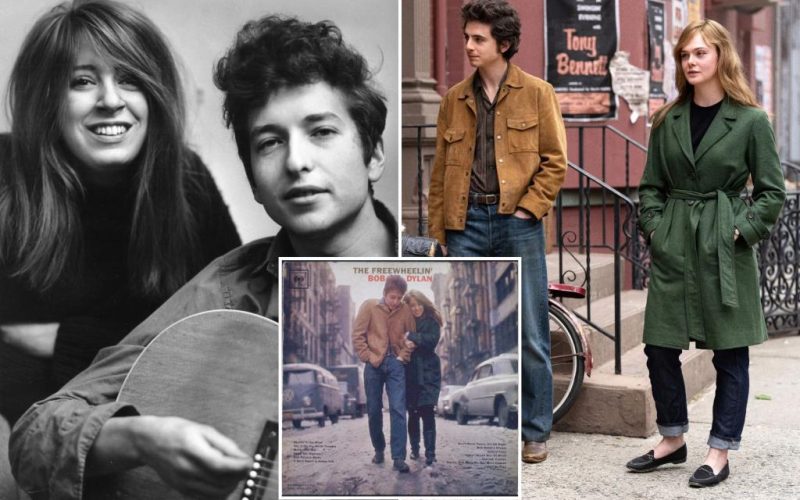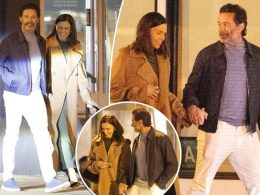In the hit Bob Dylan biopic “A Complete Unknown,” in which Golden Globes-nominated Timothée Chalamet plays a spot-on Dylan, Hollywood liberties are taken. He didn’t first meet his hero Woody Guthrie, for the first time, at a New Jersey hospital and sing “Song to Woody” for him in the room. He didn’t fall into bed with Joan Baez on the night of the Cuban Missile Crisis.
But the people in the movie are mostly real: Baez, manager Albert Grossman, Dylan’s mentor Pete Seeger. And then there’s Sylvie Russo, played by Elle Fanning, who is in at least half the scenes — serving as girlfriend, muse and even a teacher introducing him to New York City.
In actuality, she was Suze Rotolo, the teenage Queens girl who is forever famously seen walking with Dylan on the cover of the album “The Freewheelin’ Bob Dylan.” So why, when she was so prominent in his life and in the movie — which stretches from Dylan’s 1961 arrival in New York to him controversially going electric in ’65 — is Rotolo erased?
Fanning told Rolling Stone that the name change was made at the request of Dylan himself, because Rotolo, who died in 2011, “[was a] very private person and didn’t ask for this life.”
Yet, at least in later years, Rotolo was not quiet about her role in his story. In 2010, she spoke to The Post about, among other things, shooting the album cover, saying, “He wanted the look to be a certain way. With Bob … image was all.”
A former confidante of Dylan’s told The Post that the singer might have retained some guilt about their relationship. “Bob might have felt bad about the way he treated Suze,” the confidante said. “I got the sense that he was very protective of her.”
Maybe in some ways. In others, not so much. “Suze never wanted to be the woman behind the man; with Bob there was a great deal of being that,” Terri Thal, author of “My Greenwich Village” and a longtime friend of Rotolo told The Post. “For example, if somebody came up to Bob and Suze on the street, it would never occur to Bob to introduce Suze to the person. Bob needed to be front and center.”
Rotolo’s sister Carla hated him for that — fueling lyrics in his brutal “Ballad in Plain D”: “For her parasite sister I had no respect.”
Uncharacteristically, Dylan later admitted that it was a bit much. “I look back and say, ‘I must have been a real schmuck to write that,’” Dylan related to author Bill Flanagan during a 1985 interview for his book “Written in My Soul.” “Maybe I could have left that alone.”
Songs about Rotolo — with whom Dylan has said to have visited museums and discussed the transgressive French poet Arthur Rimbaud — weren’t always kind, either. In, “Don’t Think Twice, It’s All Right,” he sings, “I once loved a woman, a child I’m told” who “just kinda wasted my precious time.”
Rotolo, born in Brooklyn in 1943 and raised in Sunnyside, Queens, described herself as a red diaper baby. Her parents were both communists; her father Giochino, an illustrator and union organizer, died from a heart attack in 1958, and her mother, Mary, worked as a journalist for a commie newspaper. Mary eventually remarried and relocated with her daughters to an apartment on Sheridan Square in Greenwich Village.
There, Suze and her sister, Carla, gravitated to the early 1960s folk scene. In her memoir, “A Freewheelin’ Time,” Suze recalled of Dylan, “Wherever I looked around, Bobby was nearby. I thought he was oddly old time looking, charming in a scraggly way.”
In 1960, when Rotolo was 17, she attended a performance at Riverside Church that included Dylan (a moment that’s re-created in the movie). In her book she writes about them flirting backstage, while In his book “Chronicles: Volume One,” Dylan describes meeting Rotolo — recalling that “Cupid’s arrow … hit me in the heart and the weight of it dragged me overboard.”
There was a lot for him to glean from city girl Rotolo, despite her being two years younger. “She had been exposed to art and theater and poetry and literature; Bob had not been,” Thal said. “They came from different intellectual backgrounds. But Bob had an incredible something. From the start, people saw something special in him.”
Neither had a permanent address at the time. Rotolo was house-sitting on Waverly Place. Dylan couch-surfed downtown. Following a rave review in the Times and a deal with Columbia Records, he rented the top floor pad in a walk-up on West Fourth Street. But there was a complication with her moving in with him.
“Because of her age [17], people told her that Bob [19 at the time] could get into big trouble if she moves in with him,” Mitch Blank, a Dylanologist and collector who recently shipped boxes of his material to the Bob Dylan Center in Tulsa, Oklahoma, told The Post. “So, she continued staying in other people’s apartments until she was of legal age.”
When Rotolo eventually did move in, her mother hated the arrangement. “Suze was young and Dylan was a man on the make when he first arrived in New York, somewhat ruthless and not always as truthful as he might be,” Howard Sounes, author of “Down the Highway: The Life of Bob Dylan,” told The Post. “The mother was naturally protective of her daughter, who was a fragile highly strung person. Dylan is tough.”
Mary Rotolo referred to her daughter’s boyfriend as a “twerp” and did not believe his tall tales. Dylan, who came from Hibbing, Minnesota, was hellbent on reinvention — and, as highlighted in the film, claimed that he ran away with a circus and was taught guitar by cowboys.
Rotolo is said to have found out his real name by peeking into his wallet and seeing an ID issued to Robert Alan Zimmerman. To get under Dylan’s skin, she nicknamed him RAZ.
Eager to get her daughter out from under Bob’s thumb, Mary dangled not only a trip to their homeland of Italy, but arrangements for Rotolo to study art at the prestigious University of Perugia.
“I spent most of the voyage in a state of numbness,” Rotolo wrote, while Dylan pined for her in letters. When she sent him a shirt from Italy, he wrote back that he was wearing it in their apartment but not outside, “because I don’t want anyone to see me in it before you see me in it.”
“The relationship was … intensely sexual,” said Sounes. “Dylan writes in his memoirs that she was the most ‘erotic’ woman he’d met, an odd choice of language. But the meaning is clear. She turned him on.”
In December 1962, a homesick Rotolo returned to NYC — just as Dylan was heading to England for a TV appearance. It was a sign of things to come. As his star rose, wrote Rotolo, she was deemed “exceptional” because she “stood by the poet, the genius. I unselfishly tended to his needs and desires … I found nothing complimentary in that description.”
Rotolo was working at a kosher deli on Avenue B where she was made to wear “a silly milkmaid type of apron.” Dylan was evolving into the voice of his generation.
By August 1963, Rotolo had quit the job and moved out of Dylan’s digs because she could “no longer cope with all the pressure, gossip, truth and lies that living with Bob entailed.” She described her brain as “scrambled.”
They continued to see each other, leading to an alleged surprise pregnancy and abortion, which was illegal in New York at the time. After that, helped by her sister’s suggestion that Rotolo “was better off without the lyin’, cheatin’, manipulatin’ bastard,” the relationship slowly wound down.
In the movie, “Sylvie” walks away from Dylan at the 1965 Newport Folk Festival — his on-and-off affair with fellow folk singer Joan Baez serving as the last straw — just before the notorious performance in which he went electric for the first time. In reality, she rejected the opportunity to join Dylan on his 1965-1966 tour of England, where a disgruntled fan in Manchester famously heckled his electric set with a cry of “Judas.” (The scene is transported to the Newport Folk Festival in “A Complete Unknown.”)
By then, said Sounes, “I think they were both done with it. She had already met the guy she went on to marry” — Italian film editor Enzo Bartoccioli — “and he was with Joan Baez. But to paraphrase Dylan, the scars of broken love never heal.”
While Dylan became one of the most lauded musicians in the world, his former lover made her own way: having a son with Bartoccioli and developing a notable art career. She long maintained a low profile about her relationship with Dylan.
“Once it was over, it was over,” said Thal about Rotolo, who died of lung cancer at the age of 67 in 2011. “Bob moved into other things, into other worlds, and so did Suze.”








